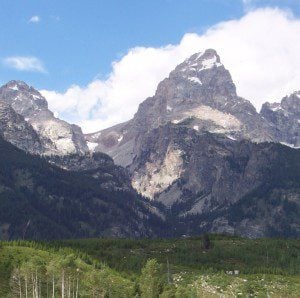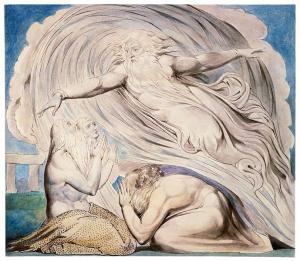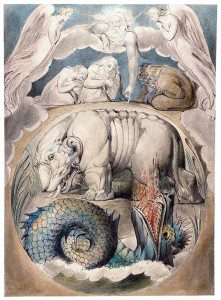 Tom McLeish focuses on the book of Job in his excursion through Faith & Wisdom in Science. This is not the whole focus – or even the conclusion – but it is the summit. ‘Nature’ plays an important role in the book. Both Job and his friends have an incomplete and/or incorrect view of God’s creation. The friends are sure that creation operates according to God’s justice and the retribution principle. God gives rain to the righteous and drought to the wicked. In this view Job’s troubles are a sure sign of his failings. Job, on the other hand, agrees that creation should be ruled by justice, but in light of his own situation suggests instead that it is ruled by uncontrolled chaos.
Tom McLeish focuses on the book of Job in his excursion through Faith & Wisdom in Science. This is not the whole focus – or even the conclusion – but it is the summit. ‘Nature’ plays an important role in the book. Both Job and his friends have an incomplete and/or incorrect view of God’s creation. The friends are sure that creation operates according to God’s justice and the retribution principle. God gives rain to the righteous and drought to the wicked. In this view Job’s troubles are a sure sign of his failings. Job, on the other hand, agrees that creation should be ruled by justice, but in light of his own situation suggests instead that it is ruled by uncontrolled chaos.
McLeish sees six themes that govern the relationship between humans and nature as revealed through the speeches of Job and his friends. (p. 139-141)
- Simple moral pendulum – the story of nature as both anthropocentric and driven by a moral law of retribution. Job’s three friends, Eliphaz, Bildad, and Zophar.
- Eternal mystery – humans are kept in the dark. Job and his friends all express this at times.
- Nature reveals God – Elihu especially gives this view, but all three friends express the sentiment at times: “nature constitutes a giant message board from its maker for those who have eyes to read it.” (p. 140)
- Uncontrolled chaos – Job in his suffering sees nature as chaotic. “Humanity is swept up in the storm and flood, which God might have held at bay, but chooses not to.” (p. 140)
- Nature worship – this is dismissed, but nonetheless given voice to as one alluring possibility. Certainly the surrounding cultures did worship “natural” phenomena assigning divinity to sun, moon, and stars.
- “A sixth storyline is hinted at, but not spoken with clarity. It has something to do with the centrality of the created physical world over any claim by humanity to a pivotal place within it.” (p. 141) Given the role played by humans in the Mesopotamian creation stories – slaves to perform work for the gods – it is not a stretch to think that such a theme may lie in the background of some of the dialogue in Job. The physical world is not anthropocentric.
 The message of Job, however, is not found in the speeches of Job or any of his friends. The message is found when God appears on the scene and addresses Job from the whirlwind. This isn’t a putdown squashing Job’s questions under God’s majesty. Rather McLeish views it as an acknowledgment of the significance of Job’s questions and his right to pose them, “for the invitation to ‘gird up your loins’ is spoken, shockingly, to a legal adversary of equal standing, not an inferior.” (p. 141) The walk through creation, including the questions posed to Job, for example:
The message of Job, however, is not found in the speeches of Job or any of his friends. The message is found when God appears on the scene and addresses Job from the whirlwind. This isn’t a putdown squashing Job’s questions under God’s majesty. Rather McLeish views it as an acknowledgment of the significance of Job’s questions and his right to pose them, “for the invitation to ‘gird up your loins’ is spoken, shockingly, to a legal adversary of equal standing, not an inferior.” (p. 141) The walk through creation, including the questions posed to Job, for example:
Have you ever given orders to the morning, or shown the dawn its place,that it might take the earth by the edges and shake the wicked out of it? (38:12-13)
(Following Clines, McLeish suggests that the words here translated wicked should instead be “Dog Stars” in light of the absence of any (other) moral reference in the speech.)
Have you journeyed to the springs of the sea or walked in the recesses of the deep? (38:16)
is designed to give Job a God’s eye view of creation.
The voice is far from simply making a point by taunting Job with his now-exposed ignorance; it is showing him other ways of thinking about creation than in relation to his human predicament. It is beginning to invite him to think about it through the eye of its creator. (p. 143)
The apparent chaos of creation certainly exists, but is channeled for God’s purpose. The fruitfulness of the earth is not solely from human benefit. ‘Anthropocentric justice’ is not at the center of creation.
Who cuts a channel for the torrents of rain, and a path for the thunderstorm, to water a land where no one lives, an uninhabited desert, to satisfy a desolate wasteland and make it sprout with grass? (38:25-27)
 Rather than bypassing Job’s questions and squashing them with is majesty, the Lord is answering Job’s questions – or more accurately guiding him to the answers for the questions he should have been asking in the first place. McLeish sees five lines of argument for this view. (p. 146-148)
Rather than bypassing Job’s questions and squashing them with is majesty, the Lord is answering Job’s questions – or more accurately guiding him to the answers for the questions he should have been asking in the first place. McLeish sees five lines of argument for this view. (p. 146-148)
- Creation is not out of control. “The axis of control and chaos is subverted by the revelation of a third path of constrained freedom in which true exploration of possibility, of life, really lies.” (p. 146)
- The Lord’s answer reconciles Job’s complaint and brings him peace. “I have heard you with my ears, and my eyes have now seen you. So I submit, and accept consolation for my dust and ashes.” (Clines’ translation of 42:5 as quoted p. 146)
We are not privy to Job’s inner response to the Lord’s answer, … But we do know that he has been led towards a radically new perspective, one that in one way totally decentralises humanity from any claim to primacy within creation, yet in another affirms the human possibility to perceive and know creation with an insight that is at least an image of the divine one. (p. 147)
- The Lord’s response is participative and invitational. Job is invited into an encounter with wisdom.
The possibility of a new relationship with the physical world is laid before Job that leaves behind the irresponsibly polarised positions to which he and his friends have been clinging. It recognizes that although ignorance is always an aspect of the human predicament, and in particular of its confrontation with the physical world, it is not a static one. (p. 147)
- The Lord’s focus on creation – the physical workings of the world – makes it clear that this is of fundamental significance.
- “The Lord’s answer is ‘eschatological’. There is a future to which everything points.
McLeish next turns to the New Testament narratives to delve deeper into the eschatological implications. We will dig into this in the next post on the book.
How does the book of Job shape our understanding of creation?
Is the biblical view of creation human-centered at its core?
If you wish to contact me directly, you may do so at rjs4mail[at]att.net
If interested you can subscribe to a full text feed of my posts at Musings on Science and Theology.















